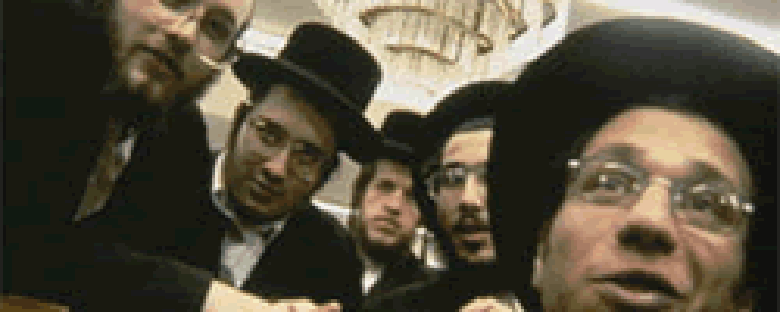Reviews
Sandi Simcha Dubowski
USA / Israel, 2001
Credits
Review by Matt Blank
Posted on 11 July 2004
Source New Yorker Video DVD
There has been a countless number of films over the years, both fiction and non-fiction, that have tried to tell us what it is like to be gay or to be Jewish. It is not every day that someone makes a film that tries to tell us what it is like to be both, which makes it a shame that Trembling Before G-d, the wildly popular-on-the-documentary-circuit film by Sandi Simcha Dubowski, amounts to not much more than your basic talking heads documentary. It is a rare, interesting, and controversial topic, but it is explored in a style that audiences have become so used to, to the point of being bored, that interest in and patience with the film’s subjects wears out well before the end of the film’s 84-minute running time.
The film is composed almost entirely of interviews with gay men and women, often in shadow or silhouette, who were raised in the Orthodox or Hasidic Jewish tradition and who now struggle to maintain their faith while attempting to express their feelings for those of their own sex. They succeed and fail in varying degrees. One man has been with his partner for 25 years, but has grown so distant from his father that they find it difficult even to send letters to each other, despite the fact that they live only several blocks from each other. Another man has never had sex with another man, but his own homoerotic feelings in conflict with his intense desire to worship are enough to shroud twenty years of his life in guilt, remorse, confusion, and emotional torment. Each subject tries to come to terms with their sexuality through the tenets of their faith that, without equivocation, forbids it. Some try to repress their sexuality, some try to hide it, some try to live as openly as possible, but in all cases, sacrifices must be made. Either one can live openly as a homosexual and be shunned by the Jewish community, or one can worship in the faith with passion and devotion yet deny their true feelings. One man, heard about but not seen on camera, has done the latter for forty years.
The primary audience for this film is not gay men and women, nor is it Jews. Homosexuals will learn nothing new about being gay or struggling with sexuality from this film, neither will Jews learn anything about the difficulties of reconciling personal feelings with the directives of Judaism. No, the primary audience seems to be non-Jewish, heterosexual liberals, which comes as no surprise since that is precisely the audience that has made this film such a hit. The film even helpfully translates onscreen some of the Hebrew words the interviewees say for the benefit of the goyim whose only exposure to the Hasidim has been a viewing of Yentl. All joking aside, while the film may be designed to appeal to a particular strain of white liberal guilt, its exploration of the intersection between sexuality and religion may help some Jewish people struggling with their sexuality to feel less alone or even find the courage to come out, or it may help gay men and lesbians understand the struggles of those among them who wish to maintain their faith. While it is not a film I want to sit through again any time soon, if it helps one person feel better about their sexuality or helps one person to understand the pain of trying to reconcile two irreconcilable yet fundamental aspects of one’s life, then I am glad the film was made.
We don’t do comments anymore, but you may contact us here or find us on Twitter or Facebook.



